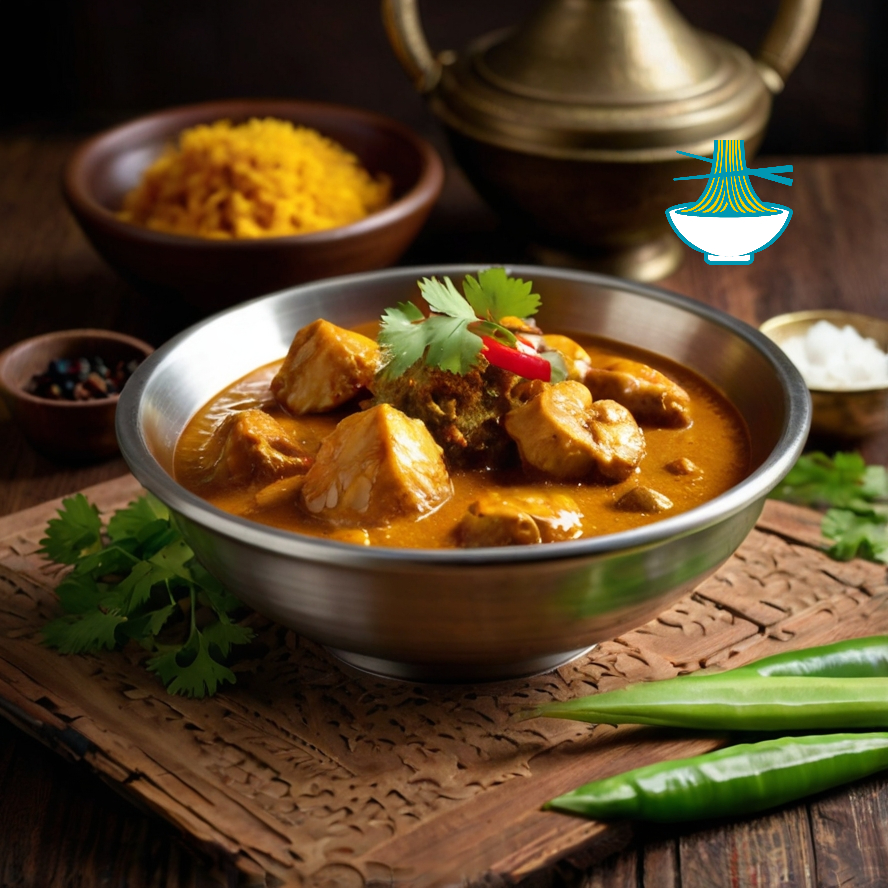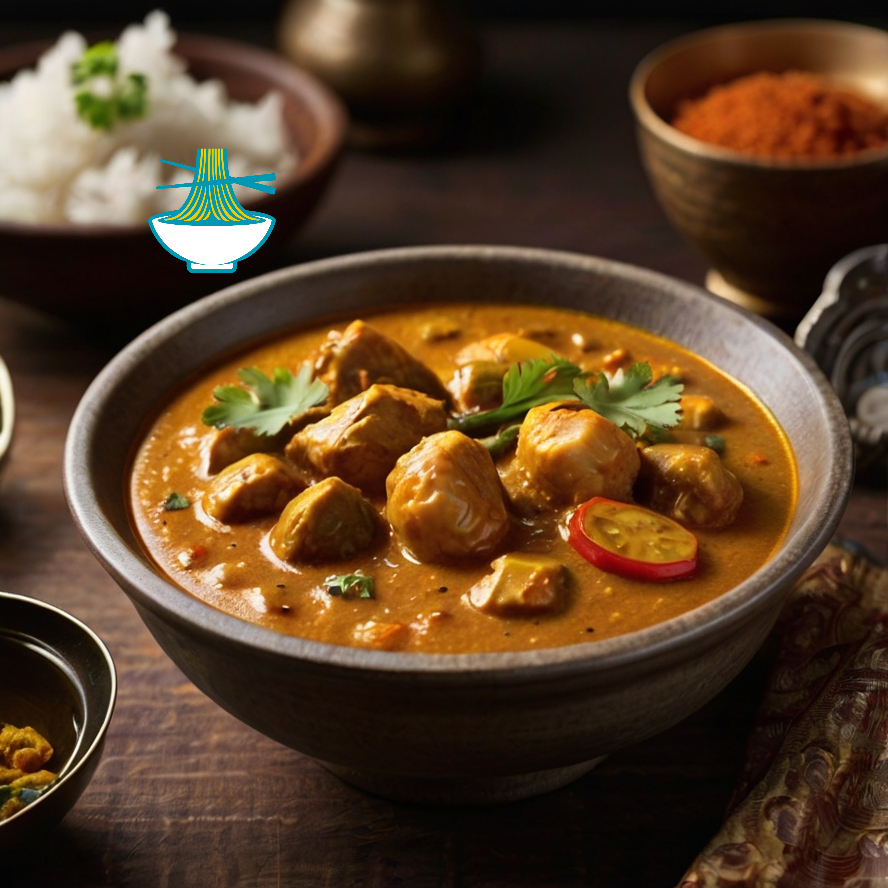Explore the rich flavors of curry with this versatile recipe featuring chicken, goat, beef, and shrimp variations. Learn about the origins and evolution of curry dishes, showcasing diverse culinary traditions.
Curry dishes trace their roots to the Indian subcontinent, where they've been enjoyed for centuries. Originally, the term "curry" referred to a variety of spiced dishes with gravy, but its meaning has evolved over time. Indian curry gained popularity globally through trade routes, with each region adding its own unique ingredients and techniques. Today, curry is celebrated worldwide, offering a delicious fusion of flavors and cultures.
Ingredients:
- 500g chicken, goat, beef, or shrimp (choose one)
- 2 tablespoons curry powder
- 1 onion, chopped
- 2 cloves garlic, minced
- 1-inch piece of ginger, grated
- 1 tomato, diced
- 1 cup coconut milk
- 2 tablespoons vegetable oil
- Salt to taste
- Fresh cilantro leaves for garnish (optional)
Method:
- Heat vegetable oil in a large pan over medium heat.
- Add chopped onion and cook until translucent.
- Stir in minced garlic and grated ginger, cook for another minute.
- Add diced tomato and cook until softened.
- Sprinkle curry powder over the mixture and stir well.
- Add your choice of protein (chicken, goat, beef, or shrimp) to the pan and cook until browned.
- Pour in coconut milk, stirring to combine.
- Reduce heat to low and simmer for 15-20 minutes, or until the protein is cooked through and the flavors meld together.
- Season with salt to taste.
- Garnish with fresh cilantro leaves if desired.
- Serve hot with rice or naan bread. Enjoy your flavorful curry dish!
Nutrition Value:
Chicken/Goat/Beef/Shrimp (500g):
- Calories: Varies depending on the type of meat, but typically ranges from 250 to 500 calories per 100g.
- Carbohydrates: Negligible (usually less than 1g per 100g).
- Protein: High protein content, ranging from 15g to 30g per 100g.
- Fat: Varies depending on the cut, with lean cuts having lower fat content (around 5g per 100g) and fattier cuts having higher fat content (up to 20g per 100g).
- Sodium and Cholesterol: Amounts can vary, but typically moderate in shrimp and poultry and higher in red meat like beef.
- Vitamins and Minerals: Rich in B vitamins (especially B12), iron, zinc, and selenium.
Benefit: Provides essential amino acids necessary for muscle building and repair, iron for oxygen transport, and various other nutrients crucial for overall health.
Curry Powder (2 tablespoons):
- Calories: Approximately 40 calories.
- Carbohydrates: Around 8g.
- Protein: About 2g.
- Fat: Around 1g.
- Sodium: Varies depending on the brand, but typically contains a moderate amount.
- Vitamins and Minerals: Contains various spices like turmeric, which is rich in antioxidants and has anti-inflammatory properties.
Benefit: Provides flavor and contains spices like turmeric, cumin, coriander, and chili powder, which have potential health benefits including anti-inflammatory and antioxidant properties.
Onion (1, chopped):
- Calories: Approximately 40 calories.
- Carbohydrates: Around 10g.
- Fiber: Approximately 1g.
- Vitamins and Minerals: Good source of vitamin C, vitamin B6, and folate. Also contains potassium and manganese.
Benefit: Adds flavor and texture, while also providing antioxidants and nutrients beneficial for immune health and metabolism.
Garlic (2 cloves, minced):
- Calories: About 5 calories.
- Carbohydrates: Around 1g.
- Vitamins and Minerals: Contains vitamins C and B6, as well as manganese and selenium.
Benefit: Adds a distinct flavor and aroma to the dish, while also providing potential health benefits such as immune support and heart health.
Ginger (1-inch piece, grated):
- Calories: Approximately 5 calories.
- Carbohydrates: About 1g.
- Vitamins and Minerals: Contains vitamin C, potassium, magnesium, and manganese.
- Nutritional Benefit: Adds a spicy, aromatic flavor to the dish and may offer anti-inflammatory and digestive benefits.
Tomato (1, diced):
- Calories: Approximately 20 calories.
- Carbohydrates: Around 5g.
- Fiber: Approximately 1g.
- Vitamins and Minerals: Rich in vitamin C, vitamin K, potassium, and folate.
Benefit: Adds sweetness and acidity to the dish, while also providing vitamins and antioxidants that support immune function and bone health.
Coconut Milk (1 cup):
- Calories: Approximately 450 calories.
- Carbohydrates: Around 6g.
- Fat: High in saturated fats, with around 48g per cup.
- Protein: About 5g.
- Sodium: Varies depending on the brand, but typically contains a moderate amount.
- Vitamins and Minerals: Contains some vitamins and minerals, including manganese, copper, iron, and selenium.
Benefit: Adds creaminess and richness to the dish, but should be consumed in moderation due to its high saturated fat content.
Vegetable Oil (2 tablespoons):
- Calories: Approximately 240 calories.
- Fat: High in fat, primarily unsaturated fats like monounsaturated and polyunsaturated fats.
- Vitamins and Minerals: May contain vitamin E, depending on the type of oil used.
Benefit: Used for cooking and adds richness to the dish, while also providing healthy fats essential for absorption of fat-soluble vitamins.
Salt (to taste):
- Sodium: Amount varies depending on usage, but should be used in moderation.
Benefit: Enhances flavor, but excessive consumption can contribute to high blood pressure and other health issues, so it's best used sparingly.
10. Fresh Cilantro Leaves (for garnish, optional):
- Calories: Negligible.
- Carbohydrates, Protein, Fat: Minimal.
- Vitamins and Minerals: Good source of vitamin K, vitamin A, and antioxidants.
Benefit: Adds freshness and a burst of flavor to the dish, while also providing some vitamins and antioxidants.


Comments